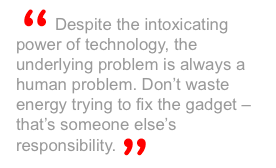Home | Solutions Blog | Fraud Detection & Prevention
Latest "Fraud Detection & Prevention" Posts
How should my business balance the risks of social media with the rewards of this increasingly dominant and highly profitable marketing medium? That’s the very insightful question that a CEO asked me during a presentation I gave on information leadership for a Vistage CEO conference.
Think of your move into social media (Facebook/Fan/Business Pages, LinkedIn, Twitter, YouTube, etc.) like you would approach the task of helping your fifteen-year-old daughter prepare to drive on her own. You love her more than anything on earth and would do anything for her (just like you will go to great lengths grow your business), but that doesn’t mean you just hand her the keys. Trying to forbid or ignore the movement into social marketing is like telling your teen that they can’t get their license. It isn’t going to happen, so you might consider putting down the denial and controlling those pieces of change that are within your power. The task is to maximize the positives of her newly bestowed freedom while minimizing any negatives; the same is true in social media.
Posted in Fraud Detection & Prevention, Identity Theft Prevention, Online Privacy by Identity Theft Speaker John Sileo.
Tags: Business Fraud, data security, Expert, Facebook, Facebook Risks, John Sileo, linkedin, Online/Social Media Privacy, Privacy, safety, Security, Social Media Business, social networking, Social Networking Business, Social Networking Risks, Speaker, twitter, YouTube
The identity theft and corporate data risk problem isn’t limited to iPad users – it affects all Tablets – but iPads are leading the way. With the rapid increase in highly powerful tablet computers, including the Motorola Xoon and Samsung Galaxy, a new survey is urging users to beware of the risks. Harris Interactive just released a study showing that tablet users transmit more sensitive information than they do on smartphones and are considerably less confident of the security protecting those tablets.
The survey shows that 48% of tablet users transfer sensitive data using the device while only 30% of smart phone users transfer sensitive information. The types of sensitive data included credit card, financial, personal and even proprietary business information. Many factors contribute to the increased risk:
- Users initially bought tablets as book readers and web browsers, but have increasingly added to their functionality with new Apps.
Posted in Cyber Data Security, Fraud Detection & Prevention, Identity Theft Prevention by Identity Theft Speaker John Sileo.
Tags: Apple, Apps, Data Breach, galaxy, Identity Theft Prevention, ipad, malware, Security, Sileo, tablet, xoon
In response to the increasing data theft threat posed by Smartphones, identity theft expert John Sileo has released The Smartphone Survival Guide. Because of their mobility and computing power, smartphones are the next wave of data hijacking. iPhone, BlackBerry and Droid users carry so much sensitive data on their phones, and because they are so easily compromised, it’s disastrous when they fall into the wrong hands.
Denver, CO (PRWEB) March 7, 2011

Smartphones are quickly becoming the fashionable (and simplest) way for thieves to steal private data. Case in point: Google was recently forced to remove 21 popular Android apps from it’s official application website, Android Market, because the applications were built to look like useful software but acted like electronic wiretaps. At first glance, apps like Chess appear to be legitimate, but when installed, turn into a data-hijacking machine that siphons private information back to the developer.
Posted in Cyber Data Security, Fraud Detection & Prevention, Identity Theft Prevention by Identity Theft Speaker John Sileo.
Tags: Android, Android Market, App Store, Applications, Apps, BlackBerry, BlackBerry Security, data security, Droid, Droid Security, Expert, Fraud, Hacking, Hijacking, iPhone, iPhone Security, jail break, jail breaking, Jailbreaking, John Sileo, Lookout, Mobile Phone, safety, Security, Smart Phone, Smartphone, Smartphone Survival Guide
 For six years I have done almost nothing professionally but study and speak on phenomenons that drive companies out of business or otherwise destroy their reputation. In the process, I have discovered what I consider to be an under-recognized and highly powerful maxim that remains relatively untapped both by people (especially leaders), and by businesses. We talk about it, but we rarely take an active role in improving it.
For six years I have done almost nothing professionally but study and speak on phenomenons that drive companies out of business or otherwise destroy their reputation. In the process, I have discovered what I consider to be an under-recognized and highly powerful maxim that remains relatively untapped both by people (especially leaders), and by businesses. We talk about it, but we rarely take an active role in improving it.
Reputation gets you what you want.
I know this because I have seen countless people’s reputation destroyed by identity theft (including mine when I was thought to be a criminal) and hundreds of businesses’ reputations wrecked because of data breach, social networking over-exposure or reputation hijacking. I know this because I’ve worked as a reputation management partner to companies that aggressively manage what the world thinks of them from an offensive perspective – they cultivate it long in advance of any attack.
Posted in Digital Reputation & Trust, Fraud Detection & Prevention by Identity Theft Speaker John Sileo.
Tags: Bad Reputation, Expert, John Sileo, Management, Online Reputation, Reputation & Trust, Reputation Management Partners, Reputation Speaker
Google recently offered $20,000 to the first person who could hack their web browser, Chrome. Without question, a hacker will crack it and prove that their browser isn’t as mighty as they might think.
So why waste the money?
In that question, ‘why waste the money?’ lies one of the root causes of all data theft inside of organizations. Google’s $20,000 investment is far from a waste of money. Consider:
- The average breach inside of an organization costs $6.75 million in recover costs (Ponemon Study). $20,000 up front to define weak points is a minuscule investment.
- Chrome is at the center of Google’s strategic initiatives in search, cloud computing, Google Docs, Gmail, displacing Microsoft IE and mobile OS platforms – in other words, it is a very valuable asset, so Google is putting their money where their money is (protecting their profits).
Posted in Cyber Data Security, Fraud Detection & Prevention, Identity Theft Prevention by Identity Theft Speaker John Sileo.
Tags: Contest, Data Breach, data security, Google Chrome, hackers, Hacking, Identity Theft Prevention, Information Offense, John Sileo
After a financial conference speech I gave this afternoon on controlling social media data exposure, an executive asked me how long I’d been giving motivational keynote speeches.
My jaw dropped at the reference… “Motivational keynote speeches?”, I asked. “I’ve never really thought of myself as a motivational speaker. I’m more of a content speaker who focuses your organization on playing information offense… using and protecting information to your profitable advantage.” Yeah, I know, sounds like an elevator speech. It was.
The executive then explained his remarks in a very thoughtful way. He said that his organization had stopped hiring traditional “fluffy motivational speakers” when the economy went south, and now only hires content-rich speakers who motivate the audience to take action in a very specific area of need. If he and the rest of the audience came out of the speech ready to take action and clear on what steps to take next, then they referred the speech as motivational. “Every speaker we hire had better be motivational,” he said, “but that’s a given. We bring in a keynoter for their content, and they’d better bring their inspirational A-game as part of the package.”
Posted in Cyber Data Security, Digital Reputation & Trust, Fraud Detection & Prevention, Identity Theft Prevention, Online Privacy by Identity Theft Speaker John Sileo.
Tags: Conference, Financial, John Sileo, Keynote, Keynote Speech, Motivational, Motivational Keynote Speech, Motivational Speech, Sileo, Speaker, Speakers, Speech, Speech Keynote, Speech Motivational, Speeches
We’ve all heard the standard tips about preventing identity theft and credit card fraud. But what would a real identity thief tell you if he had the chance? A recent interview with creditcards.com talks to a thief one on one and reveals the secrets
behind credit card theft.
Dan DeFelippi, who is 29 years old, was convicted of credit card fraud and ID theft in 2004. He tells consumers that: You can never be too careful.
DeFelippi, Learned at an early age how to create fake Id’s and he said it went down hill from there. He mostly made fake credit cards with real credit card information he bought online. He would then make fake Id’s to go with them and purchase big ticket items at Best Buy or Circuit City. He would turn around and sell them on Ebay for cash. DeFelippi says committing credit card fraud is still “ridiculously easy to do,” he says. “Anyone with a computer and $100 could start making money tomorrow.”
Posted in Cyber Data Security, Fraud Detection & Prevention, Identity Theft Prevention by Identity Theft Speaker John Sileo.
Tags: credit card fraud, credit card scam, Credit Card Thief, identity theft expert, Identity Theft Prevention, Identity Theft Speaker, John Sileo
 The Egyptian government has reportedly cut all access to the internet, extending their earlier restrictions on Twitter, Facebook, BlackBerry service and other forms of mass communication. The ban is likely to be in response to the use of social networking sites to organize pro-democracy, anit-Mubarak demonstrations in Egypt and other countries.
The Egyptian government has reportedly cut all access to the internet, extending their earlier restrictions on Twitter, Facebook, BlackBerry service and other forms of mass communication. The ban is likely to be in response to the use of social networking sites to organize pro-democracy, anit-Mubarak demonstrations in Egypt and other countries.
Internet access issues in Egypt have coincided with mounting demonstrations in the country, many of which were organized via social-networking sites like Facebook and Twitter. Thousands poured into the streets of Cairo starting Tuesday to protest failing economic policies, government corruption, and to call for an end of the nearly 30-year rule of President Hosni Mubarak. -PC Magazine
Pro-gun lobbyists worry about enforced gun registration because it could possibly give the government a way to confiscate all firearms. That’s child’s play compared to their ability to shut down access to the critical tools we use every day: the internet, email, Facebook, Google, text, cell phones – the information arsenal that we all tend to take for granted. Egypt understand the importance.
Posted in Fraud Detection & Prevention, Online Privacy by Identity Theft Speaker John Sileo.
Tags: Control, Egypt, information, Internet, Mubarak, Obama, Sileo
The latest identity theft statistics released by the Identity Theft Resource Center documented 662 data breaches* in the United States in 2010. The message couldn’t be more clear:
Corporations are not yet taking identity theft and data breach seriously enough to properly train their employees, executives, and board on the BOTTOM-LINE DESTRUCTION caused by data breach.
Sure, at this point, many organizations pay lip service to data crimes. They have a privacy policy and their marketing materials state that they do everything in their power to protect your private information. Everything, that is, unless it costs them money to do so. Many corporations tend to hide behind the excuse that in these lean times, they can’t afford to take any additional security steps. But they must understand the disproportionate costs of recovering from theft rather than preventing it. In the simplest of terms, the ROI on data theft prevention training can easily be a thousand-fold. Each record lost, according to the Ponemon Institute, costs, on average, $204 to recover. Lose 1000 records (considered a very small breach), and you are suddenly out $204,000! According to the same study, the average cost for a business to recover from a data breach is $6.75 Million. The average cost to implement identity theft, social engineering and data breach training? In most cases, less than $50,000.
Posted in Fraud Detection & Prevention, Identity Theft Prevention by Identity Theft Speaker John Sileo.
Tags: Corporate Identity Theft, Data Breach, Data Breach Prevention, Data Breach Statistics, identity theft expert, Identity Theft Prevention, Identity Theft Statistics 2010, Identity Theft Statsitics, ITRC, John Sileo, Statistics


















